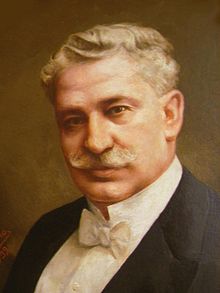Julio Acosta García
Julio Acosta García (born May 23, 1872 in San Ramón de los Palmares , Alajuela Province , Costa Rica , † July 6, 1954 in San José ) was a Costa Rican politician. From 1920 to 1924 he was the country's head of state as president .
Life
His parents were Mrs. Jesús García Zumbado and Juan Vicente Acosta Chaves. He studied at the Instituto Nacional and the Colegio San Luis Gonzaga in Cartago .
From 1902 to 1906 he was a member of parliament for Alajuela. In 1907 he was appointed consul of Costa Rica in El Salvador. Later he was plenipotentiary and special envoy to the government of El Salvador. He married Elena Gallegos Rosales, the daughter of Elena Rosales Ventura and Salvador Gallegos Valdez , on April 16, 1910 in San Salvador .
He was the governor of Alajuela Province . In 1915 he was foreign minister. He was the first minister to visit all Central American governments. He lost the post of Foreign Minister through the coup of General José Joaquín and his brother Federico Alberto Tinoco Granados in 1917.
In exile in Nicaragua, he was a member of the Tinocoa opposition. After his resignation on August 14, 1919, the interim presidents Juan Bautista Quirós Segura and Francisco Aguilar Barquero followed . Acosta returned to Costa Rica and ran for the presidential election on December 7th that year. He won the election and became the new head of state. On May 8, 1920 he officially took office.
Presidency
In 1920 a Central American conference was held in San José.
At the end of February 1921, President Belisario Porras Barahona of Panama had troops mobilized. The border conflict with Costa Rica ended with the landing of USMC .
On June 27, 1922, All-America Cable Inc. opened a telegram between Panama and Costa Rica with a telegram from Warren G. Harding .
During his tenure, the Colones that Tinoco had printed were invalidated, leading to a controversy with the UK government over the one million face value branch of Federico Alberto Tinoco's Royal Bank of Canada , Costa Rica Colónes Granados exchanged for a quarter of a million USD . The British and Costa Rican governments agreed on William Howard Taft as the arbitration board at Caso Tinoco on January 12, 1922. Taft did his Laudo Taft in 1923.
From 1932 to 1936 he was Deputy President Ricardo Jiménez Oreamuno . From 1932 to 1936 and from 1938 to 1941 he was a Member of Parliament for San José. From 1941 to 1942 the Junta Nacional de Electricidad was chair . From 1942 to 1944 was the head of the Caja Costarricense de Seguro Social . From 1944 to 1948 he was foreign minister again and represented Costa Rica at the founding conference of the United Nations in San Francisco in 1945 .
Individual evidence
- ^ The New York Times , Aug. 15, 1919, NEW COSTA RICA PRESIDENT; Tinoco Escaped from Limon , Julio Acosta has been named Provisional President of the republic. He has designated Francisco Aguilar Barquero to arrange for the holding of free
- ^ The New York Times , February 27, 1921, PANAMA READY TO DECLARE WAR ON COSTA RICA; President Signs Proclamation, but Withholds It While Seeking Dictatorial Powers.CALLS NATIONAL ASSEMBLYSummons All of Military Age, but Lacks Weapons WithWhich to Equip Them. MAY INVOLVE OTHER STATES Colombians Resident in Panama , Want to Fight for Her - Seeking Arms Here. Panama Rushes Forces to Border. 2,000 Panamans Enrolled. PANAMA HAS READY WAR DECLARATION Washington Investigating
- ^ The New York Times , March 5, 1921, COSTA RICANS TAKE NEW PANAMA TOWN; Continue Advance to Almirante --Panama Says 2, Nicaragua Reports 18 Killed. US GUNBOAT ON THE WAY League Council Sends Message to Two States - Panama Says Washington Will Mediate. 18 Dead, Many Wounded, Reported. Costa Rica Wants League Solution. State Department Asks Navy Protection
- ↑ The New York Times , June 28, 1922, HARDING OPENS CABLE .; Sends First Message Over New Line to Costa Rica President.
- ↑ untreaty, Convention for the submission to arbitration of certain claims against the Government of Costa Rica
- ↑ United States Department of State / Papers relating to the foreign relations of the United States, 1921 Volume I (1921) Refusal by the American Government to Support the British Government in Demanding Arbitration on the Validity of the Amory Concession-Decision by Costa Rica to Accept Arbitration of the Claims of John M. Amory and Son and the Royal Bank of Canada
- ↑ Time , Sep. 30, 1946, Reunion Now?
| predecessor | Office | successor |
|---|---|---|
|
Federico Alberto Tinoco Granados Francisco Aguilar Barquero |
Presidents of Costa Rica 14. – 20. August 1919 May 8, 1920 - May 8, 1924 |
Francisco Aguilar Barquero Ricardo Jiménez Oreamuno |
| personal data | |
|---|---|
| SURNAME | Acosta García, Julio |
| BRIEF DESCRIPTION | President of Costa Rica (1920–1924) |
| DATE OF BIRTH | May 23, 1872 |
| PLACE OF BIRTH | San Ramón de los Palmares , Alajuela Province , Costa Rica |
| DATE OF DEATH | July 6, 1954 |
| Place of death | San Jose |
